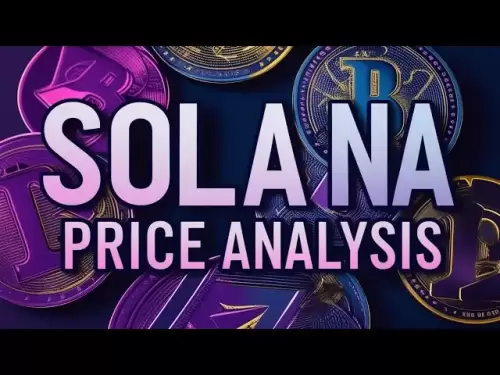-
 Bitcoin
Bitcoin $117700
-0.03% -
 Ethereum
Ethereum $3805
0.49% -
 XRP
XRP $3.098
-1.00% -
 Tether USDt
Tether USDt $1.000
0.03% -
 BNB
BNB $792.8
-1.72% -
 Solana
Solana $177.9
-1.95% -
 USDC
USDC $1.000
0.02% -
 Dogecoin
Dogecoin $0.2202
-1.55% -
 TRON
TRON $0.3278
-2.92% -
 Cardano
Cardano $0.7641
-2.43% -
 Hyperliquid
Hyperliquid $42.21
-2.68% -
 Sui
Sui $3.758
-1.58% -
 Stellar
Stellar $0.4080
-3.21% -
 Chainlink
Chainlink $17.75
-0.33% -
 Bitcoin Cash
Bitcoin Cash $591.8
4.96% -
 Hedera
Hedera $0.2561
-3.09% -
 Avalanche
Avalanche $23.34
-4.24% -
 Litecoin
Litecoin $110.7
1.96% -
 UNUS SED LEO
UNUS SED LEO $8.956
-0.01% -
 Toncoin
Toncoin $3.410
0.79% -
 Ethena USDe
Ethena USDe $1.001
0.03% -
 Shiba Inu
Shiba Inu $0.00001288
-1.82% -
 Uniswap
Uniswap $10.07
-2.06% -
 Polkadot
Polkadot $3.807
-2.27% -
 Monero
Monero $308.2
-2.15% -
 Dai
Dai $1.000
0.03% -
 Bitget Token
Bitget Token $4.521
-0.30% -
 Pepe
Pepe $0.00001134
-1.52% -
 Cronos
Cronos $0.1457
0.65% -
 Aave
Aave $274.9
-2.47%
Does owning a Bitcoin ETF mean I own Bitcoin?
A Bitcoin ETF offers exposure to Bitcoin's price without direct ownership, letting investors trade shares on stock exchanges while avoiding the complexities of crypto wallets and private keys.
Jul 30, 2025 at 01:01 pm
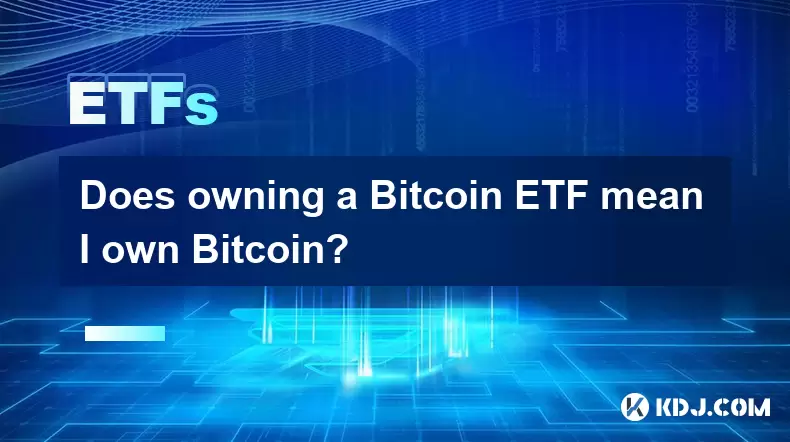
What Is a Bitcoin ETF?
A Bitcoin Exchange-Traded Fund (ETF) is a financial product that tracks the price of Bitcoin without requiring investors to directly own the cryptocurrency. Instead of purchasing Bitcoin on a digital exchange and storing it in a wallet, investors can buy shares in a Bitcoin ETF through a traditional brokerage account. These shares are designed to mirror Bitcoin’s price movements, offering exposure to the asset without the complexities of self-custody. The ETF is typically backed by actual Bitcoin held by the fund provider, although this can vary depending on the structure of the ETF.
The key distinction lies in ownership—while the ETF provider holds the actual Bitcoin, investors own shares in the fund, not the underlying asset itself.
How Does a Bitcoin ETF Work?
A Bitcoin ETF operates much like any other ETF. It is traded on traditional stock exchanges, and its value fluctuates throughout the trading day based on supply and demand. The fund provider typically holds Bitcoin in custody and issues ETF shares that represent a fractional interest in those holdings. When you buy shares of a Bitcoin ETF, you are purchasing a financial instrument that reflects the value of Bitcoin rather than the digital asset itself.
- The ETF provider purchases and securely stores Bitcoin to back the issued shares.
- Each share represents a fraction of the total Bitcoin held by the fund.
- The shares are traded on stock exchanges like regular stocks.
Do You Own Bitcoin by Owning a Bitcoin ETF?
Owning a Bitcoin ETF does not mean you directly own Bitcoin. Instead, you own shares in a fund that holds Bitcoin. This distinction is crucial for several reasons. First, you do not have access to the private keys associated with the Bitcoin held by the ETF provider. Second, your ownership is limited to the rights conferred by the ETF shares, which are governed by the fund’s prospectus and regulatory framework.
You are not a direct holder of Bitcoin on the blockchain, and you cannot transfer or spend the Bitcoin represented by your ETF shares.
Key Differences Between Owning Bitcoin and a Bitcoin ETF
There are several important differences between owning actual Bitcoin and owning a Bitcoin ETF:
- Custody and Control – With Bitcoin, you can store it in a personal wallet and have full control. With an ETF, the provider holds the Bitcoin, and you have no direct access.
- Liquidity and Accessibility – ETFs are easier to trade through traditional brokerage accounts, while Bitcoin requires a crypto exchange account and wallet setup.
- Security and Risk – Holding your own Bitcoin means you bear the risk of loss or theft. ETFs transfer that risk to the custodian, but introduce counterparty risk if the provider fails.
- Regulatory Exposure – ETFs are subject to securities regulations, which may offer more investor protections but also limit flexibility compared to direct ownership.
Why Would Someone Choose a Bitcoin ETF Over Owning Bitcoin?
Despite not owning actual Bitcoin, some investors prefer ETFs due to their convenience and integration with traditional financial systems. For instance:
- Avoiding the technical complexity of setting up wallets and managing private keys.
- Reduced exposure to self-custody risks like lost keys or hacked wallets.
- Easier access for institutional investors who may not be permitted to hold digital assets directly.
- Simplified tax reporting through existing brokerage platforms.
Frequently Asked Questions
Q: Can I redeem my Bitcoin ETF shares for actual Bitcoin?
A: Most Bitcoin ETFs do not allow individual investors to redeem shares for Bitcoin. Redemption is typically limited to large institutional players known as authorized participants.
Q: Is a Bitcoin ETF safer than owning Bitcoin directly?
A: It depends on the risk being considered. ETFs eliminate the need for self-custody but introduce counterparty risk related to the fund provider.
Q: Are Bitcoin ETFs regulated?
A: Yes, Bitcoin ETFs are subject to oversight by financial regulators, such as the U.S. Securities and Exchange Commission (SEC), ensuring compliance with securities laws.
Q: Do Bitcoin ETFs pay dividends or generate yield?
A: No, Bitcoin ETFs do not generate income like dividend-paying stocks. Their value is purely based on Bitcoin’s price performance minus management fees.
Disclaimer:info@kdj.com
The information provided is not trading advice. kdj.com does not assume any responsibility for any investments made based on the information provided in this article. Cryptocurrencies are highly volatile and it is highly recommended that you invest with caution after thorough research!
If you believe that the content used on this website infringes your copyright, please contact us immediately (info@kdj.com) and we will delete it promptly.
- LYNO Token Presale: AI Arbitrage Revolution in DeFi
- 2025-07-31 05:11:11
- Pepecoin Successors: Can These Cryptocurrencies Make You a Millionaire?
- 2025-07-31 05:50:12
- AML Bitcoin Fraud: Cracking Down on Crypto Crime in the Big Apple and Beyond
- 2025-07-31 04:33:53
- Cardano (ADA) in 2025: Navigating Crypto's Future
- 2025-07-31 03:52:07
- Solana Meme Coin Price Prediction: Will the Frog Outleap the Dog?
- 2025-07-31 03:52:07
- Bitcoin's Bullish Outlook: CryptoQuant's Insights on Futures Market Cooling
- 2025-07-31 03:59:10
Related knowledge

What is the best platform to trade Bitcoin ETFs?
Jul 23,2025 at 04:14am
Understanding Bitcoin ETFs and Their Role in TradingBitcoin Exchange-Traded Funds (ETFs) have gained significant traction among traditional and crypto...

What is the best platform to trade Bitcoin ETFs?
Jul 17,2025 at 03:50pm
Understanding Bitcoin ETFs and Their Role in the MarketBitcoin Exchange-Traded Funds (ETFs) are investment vehicles that track the price of Bitcoin wi...
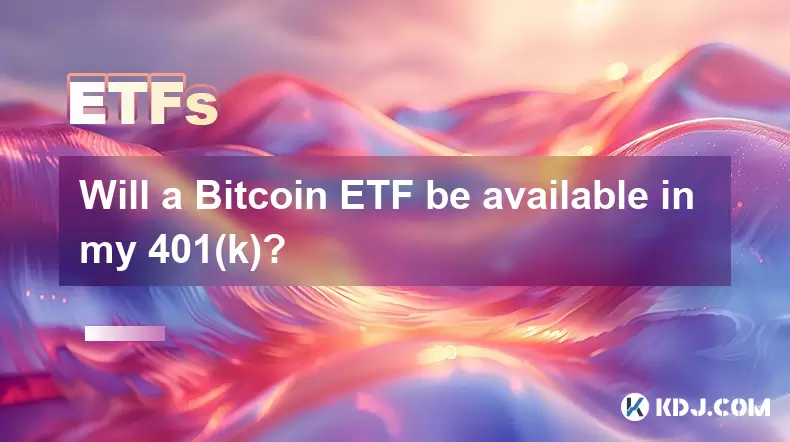
Will a Bitcoin ETF be available in my 401(k)?
Jul 17,2025 at 10:42pm
What is a Bitcoin ETF?A Bitcoin ETF (Exchange-Traded Fund) is an investment vehicle that tracks the price of Bitcoin without requiring investors to di...
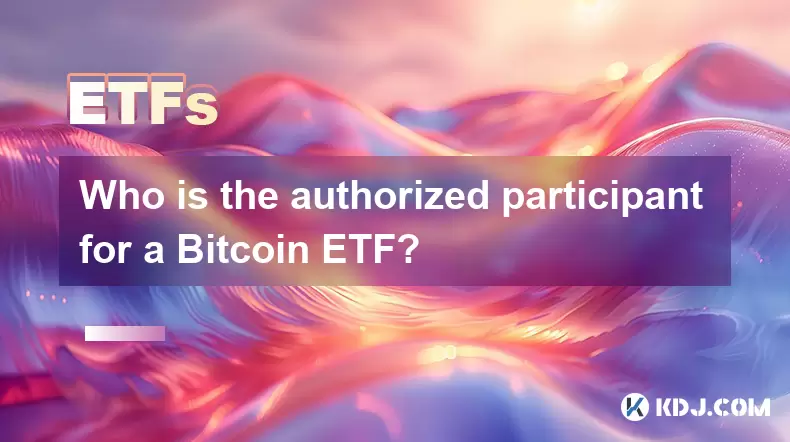
Who is the authorized participant for a Bitcoin ETF?
Jul 18,2025 at 12:42am
Understanding the Role of Authorized Participants in Bitcoin ETFsIn the context of Bitcoin Exchange-Traded Funds (ETFs), an authorized participant (AP...
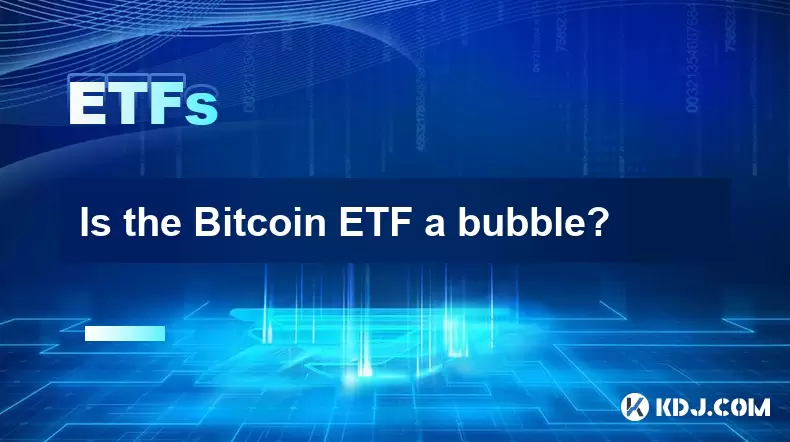
Is the Bitcoin ETF a bubble?
Jul 20,2025 at 06:57am
Understanding the Bitcoin ETF ConceptA Bitcoin Exchange-Traded Fund (ETF) is a financial product that aims to track the price of Bitcoin without requi...
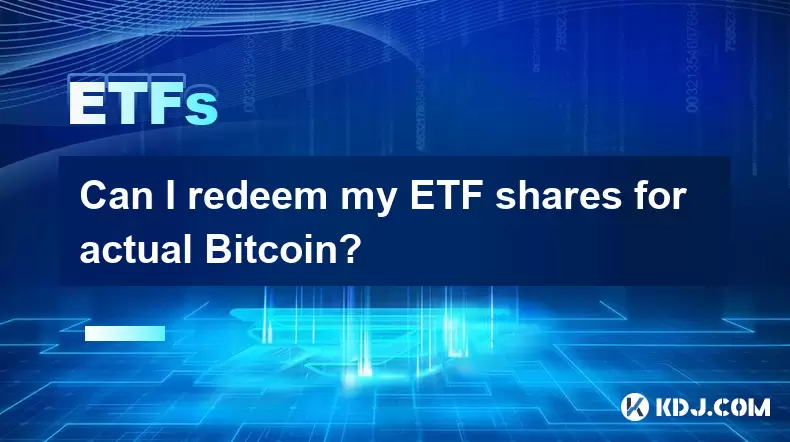
Can I redeem my ETF shares for actual Bitcoin?
Jul 17,2025 at 03:14pm
Understanding ETF Shares and Their Relation to BitcoinExchange-Traded Funds (ETFs) have become a popular investment vehicle for those looking to gain ...

What is the best platform to trade Bitcoin ETFs?
Jul 23,2025 at 04:14am
Understanding Bitcoin ETFs and Their Role in TradingBitcoin Exchange-Traded Funds (ETFs) have gained significant traction among traditional and crypto...

What is the best platform to trade Bitcoin ETFs?
Jul 17,2025 at 03:50pm
Understanding Bitcoin ETFs and Their Role in the MarketBitcoin Exchange-Traded Funds (ETFs) are investment vehicles that track the price of Bitcoin wi...

Will a Bitcoin ETF be available in my 401(k)?
Jul 17,2025 at 10:42pm
What is a Bitcoin ETF?A Bitcoin ETF (Exchange-Traded Fund) is an investment vehicle that tracks the price of Bitcoin without requiring investors to di...

Who is the authorized participant for a Bitcoin ETF?
Jul 18,2025 at 12:42am
Understanding the Role of Authorized Participants in Bitcoin ETFsIn the context of Bitcoin Exchange-Traded Funds (ETFs), an authorized participant (AP...

Is the Bitcoin ETF a bubble?
Jul 20,2025 at 06:57am
Understanding the Bitcoin ETF ConceptA Bitcoin Exchange-Traded Fund (ETF) is a financial product that aims to track the price of Bitcoin without requi...

Can I redeem my ETF shares for actual Bitcoin?
Jul 17,2025 at 03:14pm
Understanding ETF Shares and Their Relation to BitcoinExchange-Traded Funds (ETFs) have become a popular investment vehicle for those looking to gain ...
See all articles


























